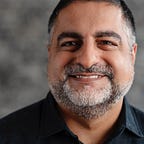Today’s Pharoah
During the Civil Rights Movement, figures like Rev. Dr. Martin Luther King, Jr., would use the language of the Promised Land to speak of a future we could have together. Like Moses, he recognized something wrong with where we were, and knew that we could do something transformative if we worked together.
The story of Moses is shared amongst Jews, Christians, and Muslims. For me, as a Muslim, before we know what the Promised Land looks like, we have to be willing to stand up to Pharaoh, and the wrongs that Pharaoh does.
Today, we must ask who builds buildings to touch the heavens with his name on them, to challenge God. A sin of Pharaoh was his arrogance and narcissism, to think that he could call himself a God, and run the country without regard for the laws.
He used forced labor to build his monuments, and then abused that labor. While slavery may be officially dead in New York, there is labor that is underpaid and undervalued, and who are then threatened with legal actions for demanding their rights.
Pharaoh was so sure of his ability not to need counsel of people, that he refused his brother’s plea to listen and avoid catastrophe. While the Hebrews suffered, the greatest suffering was on the people Pharaoh recognized as his own. What we have consistently seen is the the national debt and unemployment rise under Republican administrations, and that is with those who have expertise and knowledge. There seems to be less economic relief under the incoming administration.
We are called to stand against Pharaoh, because Pharaoh is bad for us and bad for his people. He keeps the country divided to profit himself. Oppression works by directly affecting one group of people, and by indirectly affecting another group of people who think they can profit from oppression. Yet, the oppressor cares nothing about any people. Those who seek profit will never receive it, and will remain in the system because they know that if they do not support oppression, they will be oppressed. The profit seekers are oppressed too, but have someone else to oppress.
But Pharaoh is only one oppressor.
Yazid, an avowed enemy of Islam, tried to kill the family of Prophet Muhammad. On the fields of Kerbala, in modern-day Iraq, he beheaded the favorite grandson of Muhammad, Husayn. However, before he killed Husayn and many of Husayn’s children, he denied them water for ten days. Today, Flint, MI stands at over 400 days without water; ten days time forty. Today, the water of Standing Rock is at risk. Water is life, and shows you do not need slavery to control and punish people.
Pharaoh and Yazid are archetypes of the oppressor. The oppression does not change, but takes new names. The United States fought off the Confederacy, but we have a president-elect endorsed by the KKK. We defeated the Nazis in World War II, but have an open anti-Semite as a chief strategist for the nation. We spent generations proving we were better than the Soviet Union, but have chosen to submit to the desires of a former KGB agent. What this nation fought against, because it stood against our ideals, is now in the seats of power. Oppression is pernicious; it does not die.
Imam Ali, the successor to Prophet Muhammad’s authority, says that we should resist oppression with intent, with intellect, and with action. Let us build the Promised Land, but it cannot be without challenging Pharaoh. We can have hope, but we must have principles that guide us and drive us for that new future. Every concession that is made to the oppressor means that the oppression becomes normal.
